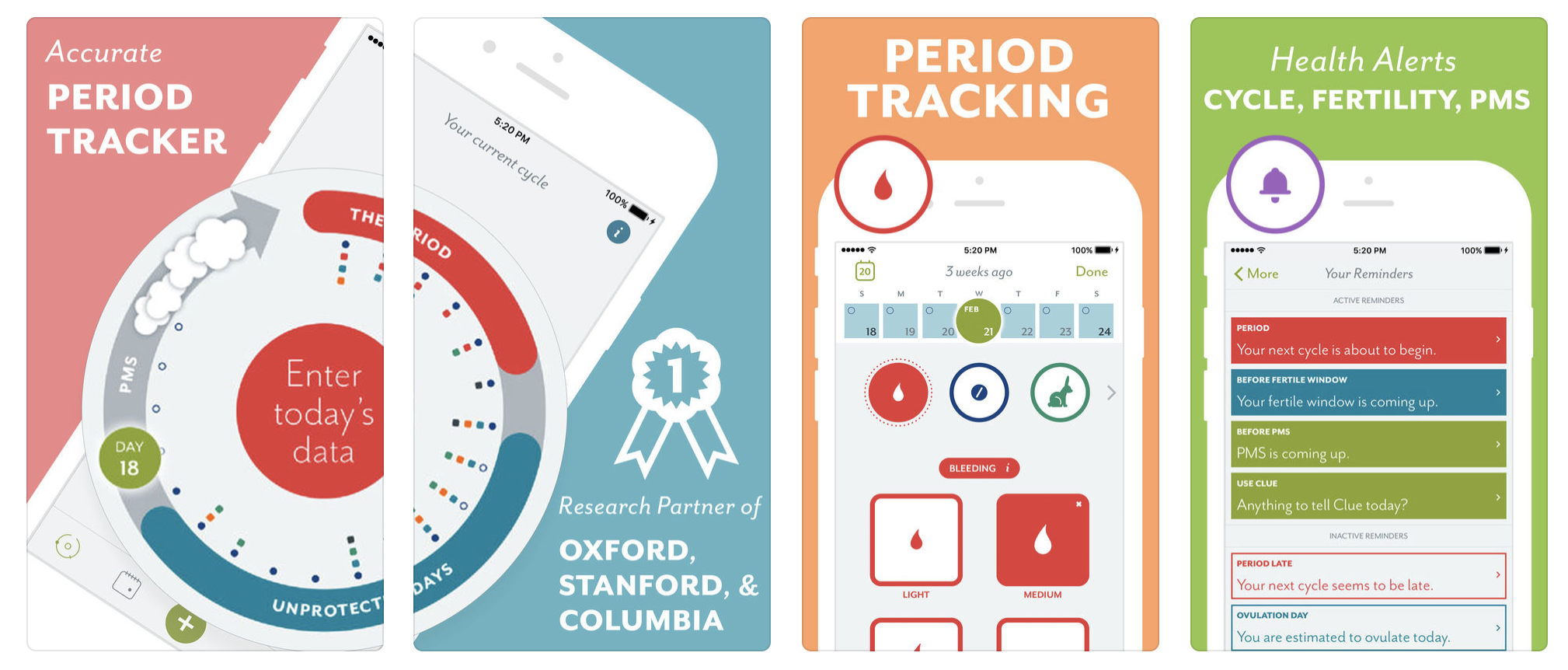Confession: Before reporting this story, I’d never used a period- tracker app. I’m not trying to conceive, the Pill makes my cycle mind-bogglingly regular, and there’s something that turns me off about the idea that every bad mood or craving I log could be linked to my reproductive biology—a product of my hormones, rather than my humanity. But apps that track your menstrual cycle are exploding—and women’s tales of devotion to theirs dominate conversations the way Fitbits or diet trackers did several years ago. My analog ways have put me firmly in the health-obsessed minority.
Advertisement – Continue Reading Below
The Big Bang of the menstrual-app universe happened in 2014, when Apple released its health-tracking app, HealthKit, with no option for women to track periods. An uproar ensued, and Apple added the feature, but not before sparking a worldwide conversation about inclusivity in the design of personal-tracking tools. That launched a boom in a sector now known as femtech, which has amassed more than $1 billion in funding since 2014. The world’s mostly male VCs, accustomed to complacently ignoring women’s health, are now pouring money into everything from complex, AI-based period-tracker apps to gadgets like a smart breast pump, a connected Kegel exerciser, and a wristband worn at night that tracks physical metrics tied to fertility. This past March, consulting firm Frost & Sullivan released data predicting a femtech market potential of $50 billion by 2025, backed by some persuasive figures: Women are 75 percent more likely to use digital tools for health care than men are, and working-age women spend 29 percent more per capita on health care compared to men. The realization that women would not only use technology to track their reproductive health, but spend considerable money on it, shook VCs awake.
Today, a search for “period tracker” in the App Store yields what the New York Times’s review site Wirecutter calls “a large, uncountable amount.” There’s San Francisco–based Glow and Eve, launched by PayPal cofounder Max Levchin. And Flo, another AI-powered tracker founded in 2015 by serial investor Yuri Gurski, based in Minsk, Belarus. Not to be confused with Flo are a smattering of smaller, similarly named apps, like Aunt Flo (tagline: “We hate your period as much as you do!”) and My Flo, which gives you a weekly food-based prescription to resolve hormonal imbalances.
Advertisement – Continue Reading Below
When I asked women on social media which they’d chosen from the dizzying array, a favorite quickly emerged: Clue, a free, AI-driven app with a four-and-a-half-star rating on the App Store. Since launching in 2013, Clue has amassed 10 million active users in nearly 200 countries, $30 million in venture funding, and 50 employees, most based in the hip, start-up–heavy Kreuzberg neighborhood in Berlin. The app was founded by Ida Tin, a 39-year-old former motorcycle tour guide from Copenhagen, and her partner (and father of their two children), German tech entrepreneur Hans Raffauf.
Devoted users of Clue are quick to laud its clean interface, inclusive tone, perceived accuracy, and role as a sort of continuing sex educator for women, thanks to its extensive “encyclopedia” of women’s health information, which you can read in pop-up windows while logging your symptoms. “I’ve used Clue for about four years, starting when we were trying to conceive our first child. It helped!” says an acquaintance, a 32-year-old leadership consultant. “But I like that it also makes it easy to learn more about the ‘why’ of your cycle. We all know a little bit about periods, but learning when the luteinizing hormone spikes as you prepare to release an egg is something I’d long forgotten from science class.” And yes, she did discover a regular craving for bread and pasta before her period. “Knowing that it’s a cycle-based craving makes it easier to resist, but also easier to give myself a pass. It’s not necessarily some terrible willpower failing; it’s nature—to a point.”
Advertisement – Continue Reading Below
Advertisement – Continue Reading Below
The language on Clue is straightforward (no cloying “Hey girl!” greetings), and care has been taken to ensure the wording and iconography aren’t gendered. “People who menstruate” is used instead of “women” to recognize users who get periods but don’t identify as female. Of the handful of apps I downloaded, Clue was the fastest and easiest to set up (you enter the date of your last period, whether you’re on birth control, and how long your cycle usually is, and you’re off) and the most intuitive to use. You can log the length and heaviness of your flow, types of menstrual pain (headache, cramps, etc.), fluctuations in sex drive, and dozens of other optional data points. You can program the app to send you reminders. And if you feel like sharing, the Clue Connect feature allows a partner or a friend to access information about your cycle.
The app also offers research-based blurbs about everything from the importance of measuring blood volume to an explanation behind the tracking category named “party” (in which you log your intake of alcohol, cigarettes, and other substances), detailing how this could impact your cycle. “It’s not enough to track data and mirror it back in a graph,” Tin says. “We also want to provide some content and context. What if I have a 40-day cycle? Should I worry? Is it normal? So the educational part is big for us.” I tell Tin that as the former sex and relationships editor at Cosmopolitan, I was regularly stunned at women’s lack of basic information—or acceptance of misinformation they found online—about their bodies. She has seen the same. “We were tempted to communicate all the latest research, and then people were like, ‘What’s a period?’ and ‘When can I get pregnant?’” she says, which led them to revisit the basics.
Advertisement – Continue Reading Below
Born in Denmark, Tin grew up crisscrossing the globe with her adventurer parents, who led motorcycle tours. Her first entrepreneurial venture was a year spent selling crystal-bead jewelry before college. Tin then did a stint in business school in Denmark and returned to the family business, leading motorcycle tours through Mongolia, Cuba, and the U.S. She loved the nomadic lifestyle but didn’t like that the business wasn’t scalable, nor was it compatible with raising a family, which she knew she wanted.
Having suffered side effects from birth control for years, Tin hit her late twenties wondering why nobody had innovated in the family-planning space in decades. So she made a prototype for a device—a thermometer with a three-month computerized memory that connected to a cell phone—and planned to develop a way for it to measure hormones through saliva. But the gadget didn’t work as expected, and investors weren’t biting.
Advertisement – Continue Reading Below
Advertisement – Continue Reading Below
In 2009, she met Raffauf at a tech conference. “The very first thing we ever talked about was this idea I had with Clue. Then we became a couple,” she says. She eventually raised €50,000 from five angels to launch a small start-up, then raised gradually bigger amounts from investors: one million, three million, then a Series A and B.
Tin has seen a big shift in investor attitudes since she first began pitching a menstrual tracker. Back then, people would say it’s a “female product, a niche thing,” she says. Now, “Nobody says that anymore.” Today the climate is different, but it’s not that investors have suddenly started caring more about women, or that “these middle-aged white guys” have been driving innovation. “It’s because people like me are starting companies that are disrupting their markets. It’s in their face.” Women, too, Tin says, are starting to demand technology that solves their problems, but change is slow. “Why is there no recommendation engine for birth control? There are 600 different brands. Where should I start? The way it works now is that the doctor will give you some random recommendation, and if it doesn’t work and you feel shitty, you can try the next one on the list. But that’s ridiculous. Pretty soon women are going to be like, ‘Hey dude, this is my well-being. Can you start creating services that actually serve my needs?’”
But for all the hype around femtech, a term coined by Tin, there are some major limitations. The biggest being the fact that most period-tracker apps are just not very good. Users were generally disappointed with their lack of accuracy, assumptions about their sexual identity, and emphasis on pink, flowery interfaces at the expense of customization, according to a 2017 study at the University of Washington, in which researchers collected data from 2,000 reviews of popular apps—including Clue, Glow, Eve, P. Tracker, and Life—and surveyed 687 people about them.
Still, as more studies are being done, Clue is emerging as one of the good ones. After noticing that women in their offices were increasingly relying on their cell phones to answer questions about reproductive health, a group of ob-gyns from Columbia University and Mount Sinai wondered about the quality of these tools. They published a study in the June 2016 issue of Obstetrics & Gynecology that looked at 20 free menstrual trackers that they deemed accurate. Clue earned the highest score.
Clue is also part of the charged conversation surrounding the use of people’s private data. Tin, for one, is eager to discuss it. “We’ve seen so many examples where we learn we cannot trust companies,” she says. In the category of women’s health trackers, she says, “it’s all about selling the data in ways that the user doesn’t know about.” Tin claims Clue waited years to store any user data, holding off until they could build a back end that was secure enough. When they were ready, the Clue team wrote their data policy in terms people could understand. Because not collecting data on women’s health, she says, isn’t the answer: “If we shy away from it, we lose twice. First, because we don’t build this tool that could be helpful to people. Second, because people who don’t care about your data are going to build [these apps] anyway. I feel a responsibility to do it in a way that I think is ethically good, and to let people know what we are doing with it.”
What Clue is doing with its users’ data is pretty remarkable. After the 2016 study ranked the app number one, researchers from academia came calling, excited by its treasure trove of information—the largest data set about menstruation in existence. Clue has now set up partnerships with institutions like Columbia, Oxford, and Stanford Universities and the Kinsey Institute, all of which hope to shed new light on a blatantly understudied segment of the population: women. (At some point, Tin and every researcher I spoke to unleashed a tirade about women’s health being an academic afterthought.)
Advertisement – Continue Reading Below
Using anonymized aggregated data from Clue’s users, Stanford researchers are looking into whether pain patterns in menstrual cycles can predict disease. The Max Planck Society is studying changes in sexual desire around ovulation. Oxford is seeking a more refined understanding of the premenstrual experience, and scientists at Columbia are searching for associations between menstrual patterns and breast-cancer risk.
“This is a completely new way that we can do research and ask questions that users really care about. And when we learn something new, we can give it back to them,” Tin says. She recalls a recent meeting with Memorial Sloan Kettering Cancer Center about ovarian and uterine cancer, diseases that are difficult to detect until people are already near death. “I was like, I wonder if we will start seeing patterns that would help detect early signs of some of these things. That would be a huge game changer.” Same with endometriosis. “What if instead of it taking an average of seven to eight years, it could take six months to a year to help people get diagnosed? It would reduce seven years of agony.”
Advertisement – Continue Reading Below
Advertisement – Continue Reading Below
While much of the Clue research is ongoing, several findings have already been released, like those from a collaboration with the Kinsey Institute’s Condom Use Research Team (CURT), which surveyed 90,000 Clue users on condom use and periods. (“Such large sample sizes are virtually unheard of in literature on sexual health,” says Stephanie A. Sanders, PhD, a senior scientist at Kinsey.) Sanders and her team were surprised to learn that women play a larger role than researchers expected in deciding when to use condoms (a good thing!). But they were also concerned that condom use declined 15 percent when users had their periods. (Not good, because there may be a greater risk of contracting sexually transmitted infections during period sex. Plus, it signals that many women don’t believe it’s possible to get pregnant during their period—it is.) The survey also found that a whopping 85 percent of respondents avoid sexual activity during their period, confirming the age-old taboo is alive and well. Sanders says these results could have a major influence on the shaping of future sexual-health education.
A smaller study from Oxford University, using Clue’s data, is finding that menstruation is more connected to immunity than previously believed. Another Clue/Oxford study debunked the prevalent theory that women’s cycles sync up with their friends’. The researchers surveyed 360 pairs of Clue users who volunteered for the study—roommates, siblings, friends, mothers, and daughters—and found no syncing at all. When I ask Tin what’s next for Clue, she sounds hesitant for the first time in our conversation. “Our biggest competitor is copying everything we’re doing,” she says of Flo, “so I’m learning to become a little more careful with what I say.”
Advertisement – Continue Reading Below
She hints of upcoming research collaborations that will study the gut’s connection to reproductive health and adds that Clue’s next investments will go toward advanced big-data tools, so that the app can answer increasingly complicated questions. And her biggest mission is to find a way to connect health data that, right now, is “absolutely scattered everywhere,” from your period app to your diet and exercise apps to your hospital X-rays. (Clue has already integrated with Fitbit, Apple Watch, and a product called Ōura, a finger ring from Finland that measures heart rate, temperature, and movement.)
Then there’s the issue of making money, which Clue does not do yet. While other apps sell data to third parties or spam users with ads, Tin isn’t interested, and hopes instead to create something so valuable that customers will want to put down money for it. “I hope people will pay to understand what’s going on inside their bodies, and see that data as a kind of life insurance,” she says. Yet she doesn’t want Clue to be exclusionary to low-income users, either. “So I don’t really know yet. We’re doing experiments.”
I’ve met my fair share of start-up founders who talk a big marketing game about “social good” but are really just out to grow big and exit swiftly. With Tin, I get the sense that she actually gives a damn. It’s hard to stay cynical when there’s a real chance to advance the future of women’s health, or when women benefit from something they’ve downloaded for free. (Clue’s site features an essay by a woman who claims the app helped hasten her diagnosis of uterine cancer, saving her life.) As period-tracker apps continue to come up in conversations with friends, I’ve found myself recommending Clue, because I believe it can be good for them, and that their data could be good for others.
As for me? I’m all in with the mission, but sadly, it’s just not that helpful. At one point in our conversation, I tell Tin that I downloaded Clue, but it didn’t give me an option to log a 90-day pill (I take Seasonique), so my cycle always reads as abnormal. “This is good feedback—we should totally have that option,” she says. “Always something to do.”
This article originally appeared in the July 2018 issue of ELLE.
Source Link – https://www.elle.com/beauty/health-fitness/a21272099/clue-period-app/





